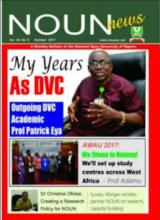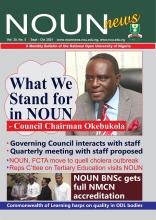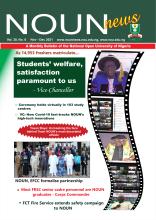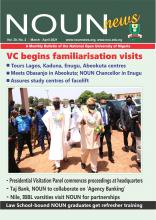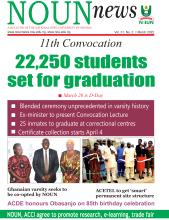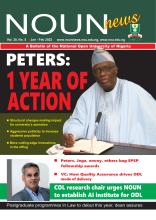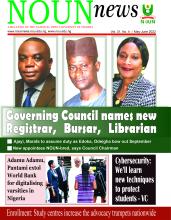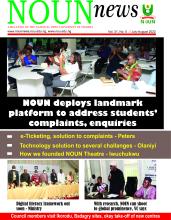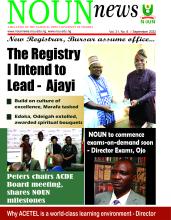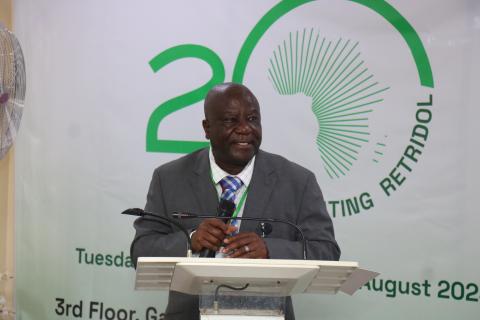
The Vice-Chancellor, National Open University of Nigeria (NOUN), Prof. Olufemi Peters, has counselled older and experienced Open and Distance Learning (ODL) institutions to leverage on their experience and core principles of ODL as their guiding light in the face of the emergence of new open universities and novel online learning platforms.
Peters, who was represented by the Deputy Vice-Chancellor, Administration, Prof. Isaac Butswat, gave the advice in his address to declare open a 2-day guest lecture and round-table discussion, organised by the Regional Training Institute for Distance and Open Learning (RETRIDOL) in collaboration with the Africa Centre for Excellence on Technology Enhanced Learning (ACETEL) to commemorate RETRIDOL's 20th anniversary.
The Vice-Chancellor expressed his delight in welcoming Professors Som Naidu and Carlos Pereira de Oliveira as distinguished guest lecturers as well as all guests at the event, while hoping "that the two lecturers will provide a platform to have a discourse about the role of distance learning in the higher education space today."
The VC commended the two host institutes for their achievements. "I am proud of the achievements of both RETRIDOL and ACETEL in the fulfilment of their distinct but related mandates to build capacity for the practice and research in Open and Distance Learning in one hand, and developing capacity for digital solutions leading to the adoption of technology for education on the other, in the West Africa sub-region.”
He further acknowledged the stiff competition evolving in the contemporary ODL world, stating that as new online learning platforms were emerging, "this form of learning is no longer the exclusive preserve of single mode higher education institutions.
"In the light of these trends, we must strategise and leverage the wealth of experiences and expertise amassed over the years."
He also identified the need for training in the fundamentals of ODL theory and practice, and more specifically in designing learning experiences as more pressing now than twenty years ago arising from the many forms of modern ODL that have evolved including online learning.
In his presentation on brief history on the establishment of RETRIDOL, former NOUN VC, Emeritus Professor Olugbemiro Jegede, took the audience down the memory lane on different sub-theme from “The Driving Force, The Imperatives & Compelling Needs, Excitement from Dream to Reality, Goals of RETRIDAL, Memorandum of Agreement, Change of Name not change of Focus.”
According to Jegede, although there have been fantastic and excellent achievements at RETRIDOL to date especially within the past two years, more still need to be done.
He listed threats such as the need to narrow the gulf between intent and action, boost capacity and capability, review strategic plan constantly, force the hands of bureaucratic and political expediency, more advocacy, training and research.
Earlier in her welcome address, RETRIDOL Director, Prof. Christine Ofulue stated that the topic for the the lecture was in line with issues facing higher education occasioned by recent global setbacks of the global pandemic and its impact on teaching and learning, forcing higher education institutes to re engineer their operations.
She appealed to participants to consider integrating technology appropriately to enhance the quality of teaching and learning.
The director further stated that RETRIDOL is an international institute that was established in August, 2003 based on a partnership between the National Open University of Nigeria (NOUN) and the Commonwealth of Learning (COL), Canada - an intergovernmental agency of the Commonwealth Heads of Government of which Nigeria, along with other commonwealth countries in the sub-region, are members.
RETRIDOL’s primary mandate is to build the capacity of higher education institutions for the Open and Distance Learning; foster regional networking, partnerships and collaboration for the promotion of ODL in the West Africa sub-region and beyond.
RETRIDOL does this primarily through organising training activities, academic programmes and research activities.
The institute has been consistently carrying out its mandate in the sub-region, specifically in the Nigeria, Ghana, The Gambia, Sierra Leone and Cameroon and, more recently, Togo and Gabon, she added.
- Log in to post comments
- 121 views

